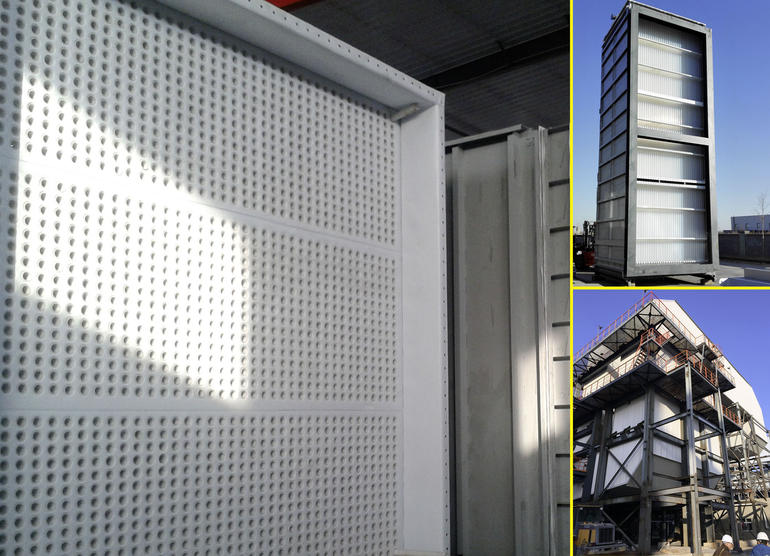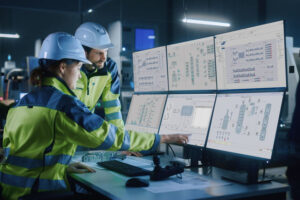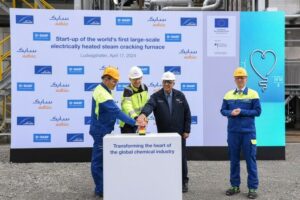Thanks to the use of Teflon PTFE based Alwaflon fluoroplastic tubes and a fluoroplastic linings, heat exchangers supplied by Wallstein Ingenieur GmbH withstand the attack of highly corrosive media released when flue gas is cooled down to well below the acid dewpoint temperature. One current application example are the gas-gas heat exchangers serving in the flue gas desulphurisation system of the waste-to-energy plant at the Chinese town of Laogang, Nanhui near Shanghai, which ranks among the world’s largest plants of its kind. At this site, four such heat exchangers have been in trouble-free continuous operation under very demanding conditions since June 2012.
As existing domestic waste landfill facilities reach the limits of capacity and impose major burdens on humans and the environment, new waste incineration plants are currently being installed and projected all across Asia. Increasingly, these installations are designed to make optimum use of the waste energy content and to provide high-efficiency cleaning of the resulting exhaust gases. Apart from selective catalytic or non-catalytic NOx reduction equipment and powerful filters, this function typically involves the use of wet-process flue gas desulphurisation systems.
World’s largest facilities of its kind
The waste-to-energy plant at Laogang set up by the Shanghai Laogang Solid Waste Utilization Co. Ltd. has a capacity of four times 750 t of domestic waste per day, making it one of the world’s largest facilities of its kind. It is also a model project in the region in terms of environmental compatibility. Rated for an electric power output of 60 MW, the plant is the first in China to rely on flue gas desulphurization by the wet process. It thus fulfils the exacting requirements of EC Directive 2000/76/EC, which imposes markedly stricter threshold limit values than current Chinese standards. The four Wallstein-supplied gas-gas heat exchangers serve in the wet-process FGD section where it is their task to substantially raise the temperature of the cleaned and cooled flue gas once again so that corrosion of downstream components – e.g., flue gas ducting, stacks – will be reliably prevented. Designed for all-round corrosion withstand capability, each of these four lines consists of two modules with 8 m long Alwaflon tubes measuring 52 mm in diameter. During operation, these tubes carry the uncleaned hot flue gas (approx. 170 °C) which gets cooled down to 108 °C by the time it enters the scrubber. Upon leaving the scrubber, the cleaned flue gas is fully steam-saturated and re-enters the gas-gas heat exchanger with a temperature of around 60 °C. Inside the heat exchanger, the gas flows around the tubes and is heated to around 120 – 125 °C before exiting the GGH unit. The use of Alwaflon fluoroplastic tubes offers benefits in many respects. Thanks to their high corrosion resistance – e.g., to hydrochloric acid (HCL), hydrofluoric acid (HF), sulphuric acid (H2SO4) and highly caustic condensates as resulting from the combustion of fossil fuels or different waste compositions – they ensure a long-term trouble-free availability of the plant. In addition, they provide a high thermal shock resistance and good heat transfer properties. Another advantage is the low time demand for cleaning cycles which, moreover, are but rarely required given the anti-stick properties of Teflon.
Experienced partner with local presence
According to Peter Dittmann, Product Manager at Wallstein Ingenieur, the operator had multiple reasons for opting to cooperate with this German mediumsized enterprise. “Our customer was looking for an experienced partner with a local presence. Wallstein Ingenieur meets both of these criteria. In our industrial heat recovery activity, we have been building heat exchanger systems for power stations and waste incineration plants very successfully for over 25 years, which gives us a broad reference portfolio. Moreover, we have been locally active via Wallstein Thermal Technology (Beijing) since 2012. With a Beijing office and a manufacturing site southeast of that city, we have a well trained team of experts in place and can cover the entire manufacturing chain that extends from the extrusion of Alwaflon fluoroplastic tubes to the assembly and erection of the finished heat exchanger modules.“ Given the good experience gathered with Alwaflon in the GGH units at Laogang, such heat exchangers have also been specified by the Shanghai Environment Group for the waste incineration plants at Fengxian (2 x 500 t/d of domestic waste) and Songjiang Tianma (4 x 500 t/d) scheduled to be commissioned in December 2015. In addition, the Chinese Guangda Group / Grantop recently ordered such GGH systems for the planned 4 x 750 t/d waste-to-energy plant at Hangzhou Jiufeng.
Combined benefits
The Alwaflon system was jointly developed in partnership between Wallstein Ingenieur, DuPont, and Fluortubing B.V. of the Netherlands. The Alwaflon trademark stands for the combined benefits of Teflon, a chemically almost inert fluoroplastic, and a special processing method tailored to this material. The product is characterised by an exceptionally high maximum usage temperature of 260 °C and a similarly high Vicat softening point of 130 °C to 140 °C, combined with both a high flexural fatigue strength and stress cracking resistance. Certain applications are made possible only by the system’s exceptionally high long-term resistance to the combined effects of internal pressure and high temperatures.
Share:







